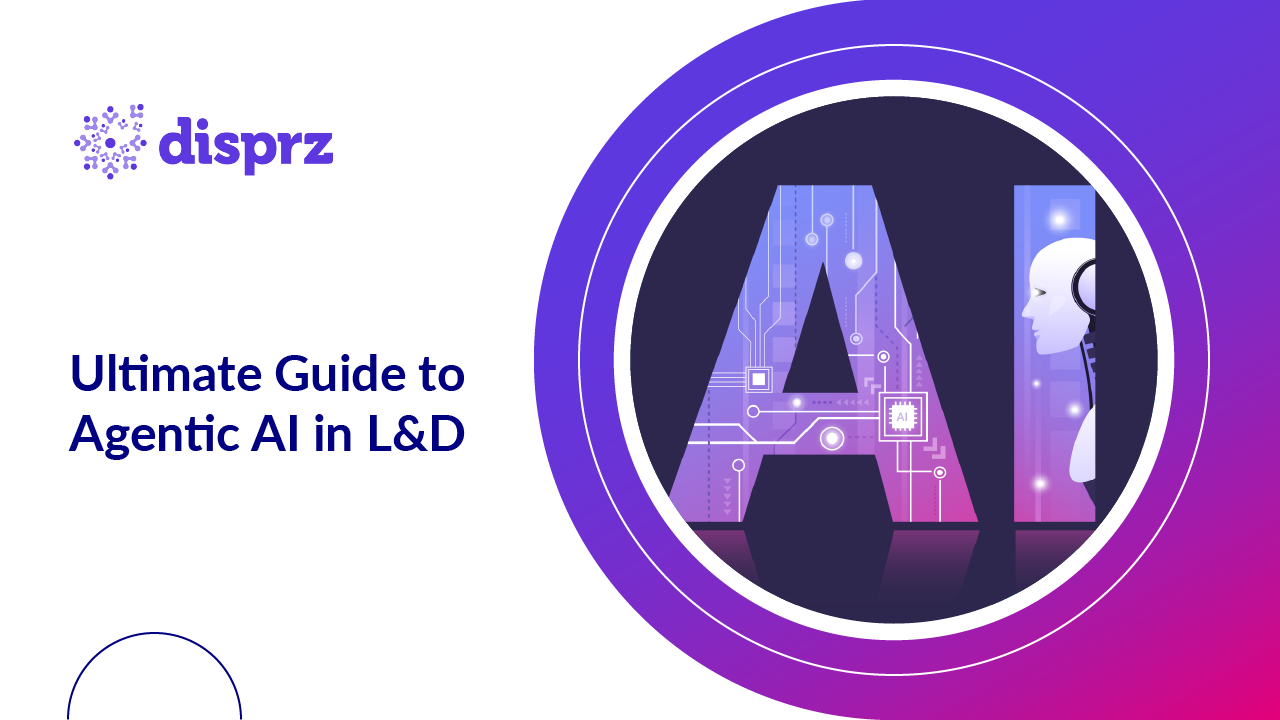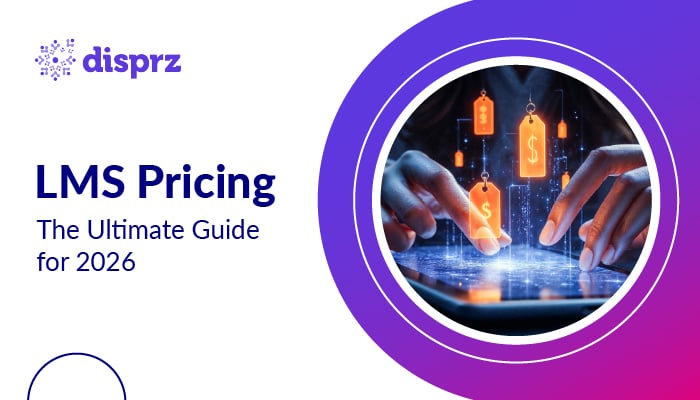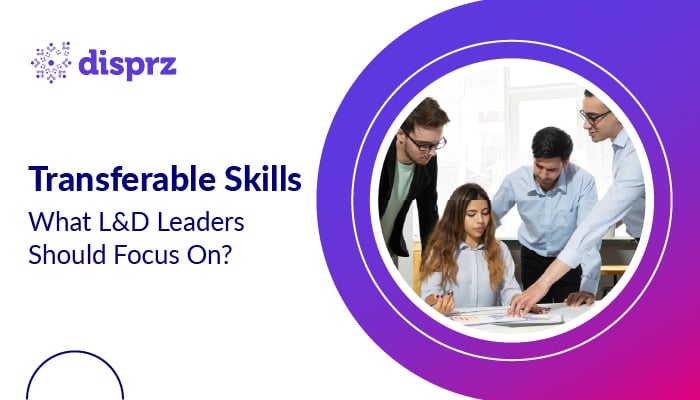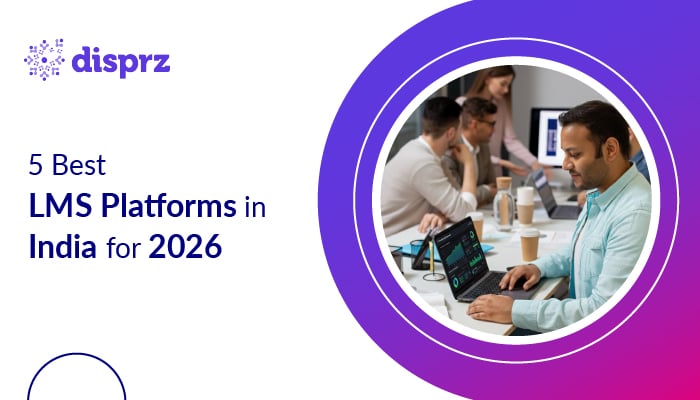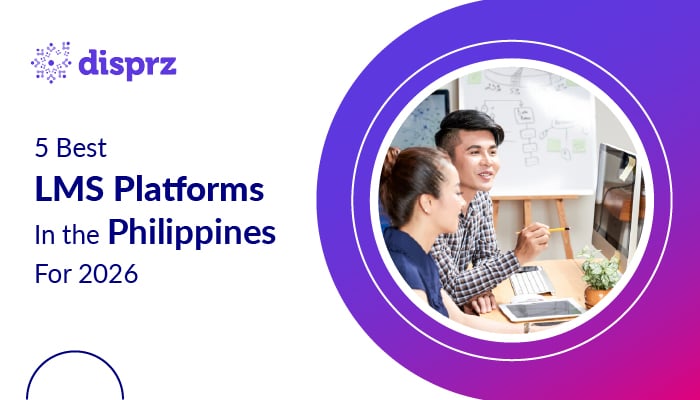As organizations look toward a more agile, adaptive, and future-ready workforce, the role of learning and development (L&D) is rapidly evolving. Traditional AI-driven systems have paved the way for automation and data-driven insights, but a new frontier is emerging: Agentic AI in L&D. In 2025, Agentic AI is poised to transform corporate learning by introducing intelligent, proactive, and autonomous learning agents that do more than recommend; they act, decide, and personalize.
Here we explore what Agentic AI means for L&D, how it redefines upskilling, and why forward-looking organizations are turning to AI-powered learning systems such as Disprz to lead this revolution. These intelligent systems go beyond traditional automation, actively shaping personalized learning journeys by continuously adapting to business needs and individual goals. They don't just recommend learning; they orchestrate it, creating seamless experiences that align with real-time skill demands, employee aspirations, and organizational outcomes. In a world where adaptability and agility are paramount, Agentic AI empowers L&D teams to take a proactive stance, transforming upskilling from a static initiative into a dynamic, outcome-driven strategy.
What is Agentic AI? Explained for L&D Professionals
Agentic AI refers to autonomous, goal-directed AI systems (also called learning agents) that can independently take initiative, make decisions, and adapt to a learner’s context. Unlike reactive systems, Agentic AI doesn’t just respond to inputs; it operates with intent, continuously optimizing learning outcomes.
In an L&D context, this means learners are not passively consuming content recommended by rule-based engines. Instead, agent-based learning AI curates, initiates, and even nudges learning based on real-time skill gaps, performance data, and organizational goals.
Imagine an AI that:
-
Tracks an employee’s progress
-
Proactively recommends learning experiences based on role evolution
-
Reorders learning paths based on engagement and feedback
-
Collaborates across departments to align learning with strategic goals
That’s the promise of Agentic AI LMS platforms in 2025; delivering continuous, intelligent learning that adapts in real time, scales rapidly, and aligns with business outcomes.
Why 2025 is the Tipping Point for Agentic AI in L&D
Several trends are converging to make 2025 the year of widespread Agentic AI adoption: From accelerated Generative AI (GenAI) capabilities to pressing talent challenges, the stage is set for a paradigm shift in how organizations approach upskilling and capability building. Businesses are no longer looking at AI as just a support tool; they’re embracing its potential to act, adapt, and scale learning with purpose. The confluence of macroeconomic uncertainty, digital transformation, and employee expectations is creating fertile ground for intelligent, autonomous systems to thrive.
Let’s explore the key drivers pushing Agentic AI to the forefront of L&D in 2025:

1) Maturity of GenAI
Tools such as GPT-4 and beyond have normalized the use of AI in content creation and interaction. Agentic AI builds on this by adding decision-making and autonomy.
2) Data-Rich Learning Environments
With years of learning data across roles, industries, and performance metrics, AI systems now have the fuel they need to drive personalized, context-aware upskilling.
3) Corporate Pressure to Reskill Fast
According to McKinsey, 87% of organizations say they have skill gaps or expect them within a few years. The speed and scale required can’t be met through traditional methods.
4) Employee Expectation for Personalized Learning Paths
Workers now demand more autonomy, relevance, and flexibility in learning; exactly what personalized upskilling AI offers.
5) CHRO Enablement and Digital Transformation
CHROs are increasingly becoming architects of talent transformation, seeking AI in LMS platforms that deliver outcomes, not just activity.
How Agentic AI Differs from Traditional Learning AI
Before diving into the technical comparison, it's important to understand the shift in mindset Agentic AI represents. Traditional AI helps automate tasks; Agentic AI helps reimagine them. In learning and development, this difference is monumental; it redefines how learning is delivered, managed, and optimized.
|
Feature |
Traditional AI in L&D |
Agentic AI in L&D |
|
Response Type |
Reactive |
Proactive & Autonomous |
|
Personalization |
Static rules-based |
Dynamic, intent-driven |
|
Decision-Making |
Manual triggers |
Self-directed by AI agents |
|
Learning Path Design |
Human-defined |
AI-generated and evolving |
|
Feedback Loop |
Periodic |
Real-time and continuous |
Agentic AI in L&D is not just a tech upgrade; it’s a paradigm shift. It redefines how learning is initiated, personalized, and delivered at scale.
What Agentic AI Means for the Future of Upskilling
The future of corporate upskilling is not about creating more content; it’s about making learning smarter, faster, and more aligned to business outcomes. Agentic AI empowers organizations to go beyond generic learning by building intelligent, autonomous pathways tailored to each learner's context and career trajectory. According to a PwC study, 79% of CEOs are concerned about skill availability, and 74% of employees say they’re ready to learn new skills to remain employable.
With such urgency, simply adding content isn’t enough; organizations need AI-powered systems that can detect, adapt, and act on learning needs in real time. Agent-based learning AI becomes a strategic ally in developing workforce capabilities that fuel long-term business resilience and innovation.
Agentic AI enables:
Real-time Skill Mapping
Constant monitoring and adjustment of skill requirements based on project data, performance reviews, and external benchmarks.
Autonomous Learning Agents
These agents function almost like AI tutors, taking over the task of managing learning progress and nudging employees just in time.
Contextual Learning
Training that's directly aligned with an employee’s role, challenges, and growth opportunities.
Integrated Upskilling Journeys
Seamlessly blending formal, informal, and social learning into one adaptive experience.
This shifts the L&D function from content delivery to outcome ownership, where learning impact is measured by skill mastery, business KPIs, and real-time adaptability; rather than course completion or participation rates alone.
Industries Leading the Shift: Where Agentic AI Is Gaining Ground
While Agentic AI is still an emerging concept, early adopters are already showing what’s possible. According to Deloitte, 41% of high-performing organizations are exploring or piloting autonomous AI agents to support talent development. In fact, a growing number of enterprises are using agent-based learning AI to shift from reactive training to proactive skill-building initiatives.
These organizations are not just implementing new technology; they're redesigning their L&D strategies around autonomy, adaptability, and agility. As a result, they're achieving faster onboarding, better retention, and higher productivity by meeting learners in the flow of work. This momentum is setting the tone for what the broader industry can expect in the next 12–18 months:
-
Retail: Personalized training for frontline employees based on customer interaction data.
-
Banking & Financial Services: Regulatory and compliance learning agents that adapt as new policies roll out.
-
Healthcare: Clinical decision-support agents that guide upskilling based on case history.
-
IT & Tech: Continuous reskilling aligned with fast-evolving tech stacks and certifications.
These industries understand that agility in skills means agility in strategy; and Agentic AI is the force accelerating that transformation. By leveraging personalized upskilling AI, learning agents, and AI-powered learning systems, they’re staying ahead of disruptions, enabling faster decision-making, and fostering real-time workforce adaptability across frontline and knowledge worker roles alike.
L&D’s Role in an Agentic AI Learning 2025
As organizations rapidly embrace AI-driven learning platforms, the role of learning and development (L&D) professionals is undergoing a significant transformation. No longer confined to designing static training modules, L&D leaders in 2025 are emerging as strategic enablers and orchestrators of intelligent learning ecosystems. In this agentic AI era, where autonomous learning agents proactively guide learners, the responsibilities of L&D professionals must evolve to match the complexity and potential of these systems.
Key responsibilities will include defining clear objectives and performance outcomes for learning agents to ensure they deliver value-aligned, goal-driven support. L&D leaders must also uphold ethical standards by maintaining transparency around how AI makes decisions and ensuring data privacy and fairness in recommendations. Actively monitoring AI-generated learning paths and continuously optimizing them based on employee feedback and business needs will be vital to ensure relevance and engagement.
Moreover, L&D must work in close collaboration with CHROs and other business leaders to align learning strategies with workforce planning and organizational transformation goals. Upskilling and reskilling initiatives will need to be agile, data-informed, and seamlessly integrated into daily workflows; driven by AI but curated by human insight.
This future positions L&D as a central strategic function within the enterprise, empowered by agentic AI learning platforms such as Disprz. With the right vision and tools, L&D professionals won’t just support change; they’ll lead it, shaping a more personalized, responsive, and impactful learning experience for every employee across the organization.
Conclusion: Disprz and the Agentic Learning Vision
Disprz is pioneering a transformative shift in how organizations approach learning and development by integrating intelligent, autonomous, and deeply human-centric AI systems. At the heart of this transformation lies the organization’s commitment to agentic learning; where AI doesn’t merely assist but acts with autonomy to drive outcomes. With a strong focus on personalized upskilling, AI-driven learning agents, and autonomous decision-making systems, Disprz enables organizations to create scalable, contextual learning ecosystems tailored to individual needs.
By leveraging real-time data, behavioral insights, and skill analytics, Disprz ensures that every employee’s learning journey is unique, relevant, and aligned with evolving business objectives. Whether it's identifying critical skill gaps, recommending hyper-personalized learning paths, or fostering a culture of continuous development, Disprz makes learning proactive, dynamic, and self-directed.
As we step into 2025; a year that signals the rise of Agentic AI in the learning and development space; Disprz is not just prepared for the change; it is positioned to lead it. The future of corporate upskilling is no longer about static content or one-size-fits-all solutions. It’s about intelligent agents that understand, adapt, and empower individuals to grow in sync with the pace of organizational change.
In this new era of agentic learning, where autonomy meets personalization, Disprz offers more than a platform; it offers a strategic advantage. Ready to embrace the next evolution in workforce development? Let Disprz be your partner in unlocking the future of learning; smarter, faster, and more human than ever before.



